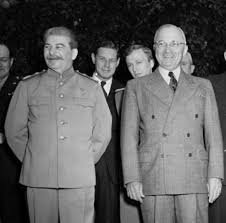Prof. Kathryn Weathersby

Truman and Stalin
In the last post, we saw that in April 1947 the Soviets and Americans agreed to resume the meetings of the Joint Commission, even though neither government believed this would actually lead to the creation of a provisional government for Korea. It appears that this action was part of a general campaign by the two occupying powers to create positive images among peoples they occupied in various places, particularly Germany.
At the Yalta Conference of February 1945, with the defeat of Germany imminent, the British, Americans, and Soviets agreed to jointly occupy and administer the country after its surrender. The allies originally planned to create three occupation zones, but the British insisted that they add a zone for the French, out of fear that the US would withdraw and leave them to face the Soviets on their own. The extraordinary destructiveness of the war, and the fact that Germany had brought the first world war as well, led the British, Americans, and Soviets to consider permanently dividing and deindustrializing the former enemy. However, in the weeks after the Yalta Conference, the British and Americans concluded that the rest of Europe would never recover from the war unless Germany was revived, though purged of its Nazi institutions and personnel.
The allies created a Four-Power Allied Control Council, located in Berlin, to administer the occupation. They also divided the capitol city itself into four occupation zones, though the intention was to administer it as a single political unit. However, as was the case in Korea, the former allies were unable to agree on a common occupation policy for Germany.
The most contentious issue was reparations. At Yalta the allies had agreed that Germany would be required to pay reparations to the countries it had harmed, and that the Soviet Union would receive half of the total reparations since it had suffered by far the greatest damage. By the time of the Potsdam Conference, however, the British and Americans worried that they would have to continue to provide food and shelter for the German people if heavy reparations slowed Germany’s economic recovery. Since Moscow was planning to extract as much resources as it could from Germany, this would mean that the US and UK would in effect be subsidizing the postwar reconstruction of the Soviet Union.
The geographical situation of divided Germany was the opposite of circumstances in Korea. The Soviet zone in the east was mainly agricultural, while the valuable industrial centers were located in the British, French, and American zones. Moscow therefore rejected the American proposal that the occupying powers would extract reparations only from their own zones. The allies eventually agreed that 10% of the industrial equipment from the Western zones would be sent to the Soviet Union as reparations and another 15% would be exchanged for food and raw materials the Soviets would send to the western zones.
The Soviets quickly stripped their zone of its economic assets, as they did in Korea as well. However, they failed to send food and raw materials to the western zones, as they had agreed to do in exchange for the industrial equipment they received. In 1946 the American representatives in the Allied Control Council tried unsuccessfully to persuade the Soviets to treat reparations as part of a comprehensive plan for managing the German economy as a whole. In May of that year, the same time the Joint Soviet/American Commission ceased its meetings in Seoul, the US suspended all reparations deliveries from its zone of Germany to the Soviet zone in order to pressure Moscow to stop its unilateral seizures of German resources. As they did in Korea, the Soviets also began confiscating and redistributing large landholdings in their zone of Germany.
As the Soviets and Americans struggled over the reparations issue in Germany through 1946, they also began to compete to win the support of the German people. In the next post we will see how they appealed to German desire for the restoration of a unified state and how this effort shaped their decision to resume meetings of the Joint Commission in Korea.
[Sources: This post relies on the excellent account of the German issue in William R. Keylor, A World of Nations: The International Order Since 1945 (Oxford University Press, 2009)]
the work that tells about several countries meeting in korea,really a meaningful article sir @wisdomandjustice
Downvoting a post can decrease pending rewards and make it less visible. Common reasons:
Submit
Thank you for your interest
Downvoting a post can decrease pending rewards and make it less visible. Common reasons:
Submit
Thank very much sir,thank for sharing @wisdomandjustice
Downvoting a post can decrease pending rewards and make it less visible. Common reasons:
Submit
Posts that remind me of the importance of history, are extraordinary.
Downvoting a post can decrease pending rewards and make it less visible. Common reasons:
Submit
Thank you so much
Downvoting a post can decrease pending rewards and make it less visible. Common reasons:
Submit
Unpaid related articles
Related articles
Interesteem(@interesteem) is a service that recommends related articles using DeepLearning.
Please write an article with #interesteem tag.
Downvoting a post can decrease pending rewards and make it less visible. Common reasons:
Submit
I will read this article later. It seems very interesting.
Downvoting a post can decrease pending rewards and make it less visible. Common reasons:
Submit
Thank you
Downvoting a post can decrease pending rewards and make it less visible. Common reasons:
Submit
Buenos día excelente post tiene buena información de historia me encantó. Saludos desde Venezuela. Lo invito a visitar mi blog hasta luego
Downvoting a post can decrease pending rewards and make it less visible. Common reasons:
Submit